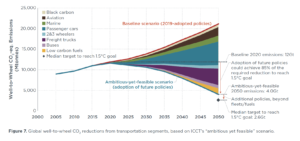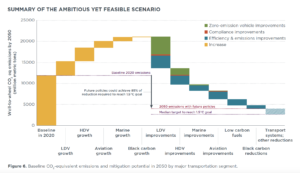Starting 2021 it’s a good moment look forward to decarbonizing the global transport sector by 2050. Global demand for passenger and freight transportation continues to rise, driven by population and economic growth. As transportation demand has grown so too have carbon emissions from the global transportation sector. September 2020 ICCT presented an inspiring white paper on decarbonization. Electric vehicles are the single most important technology for decarbonizing the transport sector.
The effects of the warming that has already occurred as a consequence of anthropogenic emissions of carbon dioxide and other greenhouse gases are dire enough. Scientists warn that we must steeply reduce greenhouse gas emissions by mid-century to avoid additional warming that will have genuinely catastrophic effects. In that light, transforming the technologies and systems that move people and goods around the world appears imperative.
Greenhouse gas emissions do not even fully describe the environmental challenges posed by the rising demand for transportation in a system that remains dependent on burning fossil fuel. The public health toll of air pollution, especially in large cities, remains high. More than 90% of the world’s population lives in areas that do not meet the air-quality guidelines set by the World Health Organization.
Climate and health impacts are inherently coupled. The bottom line is that a sector almost exclusively dependent on a single energy source, petroleum, operating on infrastructure that represents trillions of dollars of investment, must change substantially in little more than a generation.
Many people have engaged in these problems. Policymakers at all levels of government are working to implement new environmental protections and other measures. The automotive industry is investing in the development and deployment of new technologies. Philanthropies are directing large sums to support climate action. Advocacy and consumer groups are launching campaigns to raise awareness and put pressure on decision-makers. Scientists and academic institutions are conducting research and analyses to support decision-making.
The International Council of Clean Transportation ICCT works with these stakeholders. The white paper summarizes their vision for decarbonizing the transport sector. Vison 2050 addresses four central questions:
- What is the baseline trajectory of global transportation emissions from 2020 to 2050 by country and by vehicle segment?
- What is the magnitude of reductions needed if the global transport sector is to contribute to keeping global temperature rise below 1.5˚C?
- What is an ambitious yet feasible set of policies and technologies for decarbonizing the transportation sector by mid-century?
- What are the highest priority focus areas over the next five years?
The ICCT “ambitious yet feasible” scenario primarily relies on the successful deployment of four key types of policy:
- Efficiency standards mandating that manufacturers achieve a certain CO2 emission or fuel-efficiency target in new vehicles.
- Zero-emission vehicle mandates that require manufacturers to achieve a certain fraction of zero-emissions vehicles in their total annual sales volume.
- Emissions standards mandating that manufacturers meet certain emissions limits for specific pollutants, such as particulate matter or nitrogen oxides, in new vehicles.
- Renewable fuels standards requiring fuel suppliers to include a certain content of renewable fuels in the fuel mix they sell.
Check out the webinar organized by the World Economic Forum.
Source: ICCT


